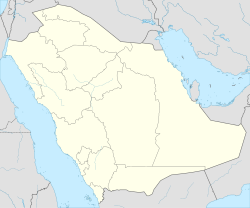Riyadh
Riyadh (/rɨˈjɑːd/; Arabic: الرياض ar-Riyāḍ Najdi pronunciation: [er.rɪˈjɑːðˤ]) is the capital and most populous city of Saudi Arabia. It is also the capital of Riyadh Province, and belongs to the historical regions of Nejd and Al-Yamama. It is in the center of the Arabian Peninsula on a large plateau, and is home to 6.5 million people.[2]
Riyadh
الرياض | |
|---|---|
Capital city | |
 Riyadh with the Kingdom Center in the background | |
| Coordinates: 24°38′N 46°43′E / 24.633°N 46.717°E | |
| Country | |
| Government | |
| • Riyadh Prince Governor | Faisal bin Bandar Al Saud |
| • Mayor | Ibraheem Mohammed Al-Sultan |
| Area | |
| • Total | 1,798 km2 (694 sq mi) |
| Elevation | 612 m (2,008 ft) |
| Population (2015)[1] | |
| • Total | 7,125,180 |
| • Density | 4,000/km2 (10,000/sq mi) |
| Time zone | UTC+3 (AST) |
| • Summer (DST) | UTC+3 (AST) |
| Postal Code | (5 digits) |
| Area code | +966-11 |
| Website | High Commission for the Development of Riyadh Riyadh Municipality |
The city is divided into 15 municipal districts, managed by Riyadh Municipality headed by the mayor of Riyadh, and the Riyadh Development Authority, chaired by the governor of Riyadh Province, Faisal bin Bandar Al Saud. The current mayor of Riyadh is Ibrahim Mohammed Al Sultan. He was appointed mayor in 2015. It has been designated a global city.
History
changeEarly history
changeDuring the Pre-Islamic era the city at the site was called Hajr (Arabic: حجر), and was reportedly founded by the tribe of Banu Hanifa.[3] Hajr served as the capital of the province of Al Yamamah, whose governors were responsible for most of central and eastern Arabia during the Umayyad and Abbasid eras. Al-Yamamah broke away from the Abbasid Empire in 866 and the area fell under the rule of the Ukhaydhirites, who moved the capital from Hajr to nearby Al Kharj. The city then went into a long period of decline. In the 14th century, North African traveller Ibn Battuta wrote of his visit to Hajr, describing it as "the main city of Al-Yamamah, and its name is Hajr". Ibn Battuta goes on to describe it as a city of canals and trees with most of its inhabitants belonging to Bani Hanifa, and reports that he continued on with their leader to Mecca to perform the Hajj.[4]
Geography and climate
changeCity districts
changeRiyadh is divided into fifteen branch municipalities,[5] in addition to the Diplomatic Quarter. Each branch municipality in turn contains several districts, amounting to over 130 in total, though some districts are divided between more than one branch municipality. The branch municipalities are Al-Shemaysi, Irqah, Al-Ma'athar, Al-Olayya, Al-Aziziyya, Al-Malaz, Al-Selayy, Nemar, Al-Neseem, Al-Shifa, Al-'Urayja, Al-Bat'ha, Al-Ha'ir, Al-Rawdha, and Al-Shimal ("the North"). Olaya District is the commercial heart of the city,[6] with accommodation, entertainment, dining and shopping options. The Kingdom Center, Al Faisalyah and Al-Tahlya Street are the area's most prominent landmarks. The centre of the city, Al-Bathaa and Al-Dir'iyyah, is also its oldest part.
Climate
changeClassified as having a hot desert climate (Köppen: BWh), temperatures during the summer months are extremely hot. The average high temperature in August is 43.6 °C. Winters are warm with cool, windy nights. The overall climate is arid, and the city experiences very little rainfall, especially in summer, but receives a fair amount of rain in March and April. It is also known to have dust storms during which the dust can be so thick that visibility is under 10 m (33 ft). On 1 and 2 April 2015, a massive dust storm hit Riyadh, causing suspension of classes in many schools in the area and cancellation of hundreds of flights, both domestic and international.
| Climate data for Riyadh (1985-2010) | |||||||||||||
|---|---|---|---|---|---|---|---|---|---|---|---|---|---|
| Month | Jan | Feb | Mar | Apr | May | Jun | Jul | Aug | Sep | Oct | Nov | Dec | Year |
| Record high °C (°F) | 31.5 (88.7) |
34.8 (94.6) |
38.0 (100.4) |
42.0 (107.6) |
45.1 (113.2) |
47.2 (117.0) |
48.0 (118.4) |
47.8 (118.0) |
45.0 (113.0) |
41.0 (105.8) |
38.0 (100.4) |
31.0 (87.8) |
48.0 (118.4) |
| Average high °C (°F) | 20.2 (68.4) |
23.4 (74.1) |
27.7 (81.9) |
33.4 (92.1) |
39.4 (102.9) |
42.5 (108.5) |
43.5 (110.3) |
43.6 (110.5) |
40.4 (104.7) |
35.3 (95.5) |
27.8 (82.0) |
22.2 (72.0) |
33.3 (91.9) |
| Daily mean °C (°F) | 14.4 (57.9) |
17.3 (63.1) |
21.4 (70.5) |
26.9 (80.4) |
32.9 (91.2) |
35.7 (96.3) |
36.8 (98.2) |
36.7 (98.1) |
33.5 (92.3) |
28.4 (83.1) |
21.5 (70.7) |
16.3 (61.3) |
26.8 (80.3) |
| Average low °C (°F) | 9.0 (48.2) |
11.2 (52.2) |
15.2 (59.4) |
20.4 (68.7) |
25.9 (78.6) |
28.0 (82.4) |
29.3 (84.7) |
29.2 (84.6) |
25.9 (78.6) |
21.2 (70.2) |
15.5 (59.9) |
10.6 (51.1) |
20.1 (68.2) |
| Record low °C (°F) | −2.2 (28.0) |
0.5 (32.9) |
4.5 (40.1) |
11.0 (51.8) |
18.0 (64.4) |
16.0 (60.8) |
23.6 (74.5) |
22.7 (72.9) |
16.1 (61.0) |
14.0 (57.2) |
7.0 (44.6) |
1.4 (34.5) |
−2.2 (28.0) |
| Average rainfall mm (inches) | 12.5 (0.49) |
8.0 (0.31) |
24.0 (0.94) |
28.0 (1.10) |
4.9 (0.19) |
0.0 (0.0) |
0.0 (0.0) |
0.4 (0.02) |
0.0 (0.0) |
0.8 (0.03) |
8.7 (0.34) |
14.6 (0.57) |
101.9 (3.99) |
| Average rainy days | 6.1 | 4.3 | 9.4 | 11.3 | 3.3 | 0.0 | 0.1 | 0.2 | 0.0 | 0.5 | 3.3 | 6.3 | 44.8 |
| Average relative humidity (%) | 47 | 36 | 32 | 28 | 17 | 11 | 10 | 12 | 14 | 20 | 36 | 47 | 26 |
| Mean monthly sunshine hours | 212.4 | 226.6 | 219.8 | 242.3 | 287.7 | 328.2 | 332.1 | 309.2 | 271.6 | 311.4 | 269.2 | 214.3 | 3,224.8 |
| Percent possible sunshine | — | — | — | — | — | — | — | — | — | — | — | — | 72 |
| Source: "Jeddah Regional Climate Center South West Asia". Archived from the original on 2016-12-11. Retrieved 2016-12-25. [7] | |||||||||||||
References
change- ↑ "Population". Statistical Yearbook 47 (2011). Central Department of Statistics & Information. Archived from the original on 1 December 2013. Retrieved 15 November 2013.
- ↑ "About arriyadh". Archived from the original on 2009-01-27.
- ↑ Sonbol 2012, p. 99.
- ↑ "Exploring the Deep History and Culture of Riyadh, Saudi Arabia's Capital City". Matador Network. Retrieved 2025-01-09.
- ↑ "Interactive Map of Riyadh's branch municipalities" (in Arabic). Riyadh Municipal Government.
- ↑ MEED. Economic East Economic Digest, Limited. 2004. p. 4.
- ↑ "Surface annual climatological report". PME. Archived from the original on 2016-03-04. Retrieved 2016-12-25.

